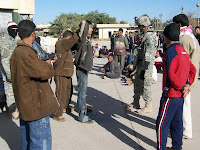 Meanwhile, grassroots efforts are taking place to institutionalize the security gains of recent months, while at the same time work towards sectarian reconciliation in the absence of legislative action at the national level. Neighborhood volunteers, dubbed Critical Infrastructure Guards (GIG's), have been recruited in Sunni neighborhoods to receive rudimentary training, and work alongside the predominantly Shia Iraqi Army and Iraqi Police. They've begun jointly manning checkpoints, and participating in joint patrols of the neighborhoods. The Iraqi soldiers are supposed to assume the role of mentors to these new recruits, and provide them with additional on-the-job training. In return, the new volunteers bring to the table local knowledge of the neighborhoods from whence the come, as well as vastly improved relationships between the security forces and the residents of the communities, who are the friends and family of the new volunteers. As the CIG's gain experience, a certain percentage will be selected to attend the Iraqi Police Academy where they will undergo additional training, and shed their quasi-official status. Under the umbrella of increasingly detached American oversight, the hope is that the program will result in a much improved and professional Iraqi security apparatus.
Meanwhile, grassroots efforts are taking place to institutionalize the security gains of recent months, while at the same time work towards sectarian reconciliation in the absence of legislative action at the national level. Neighborhood volunteers, dubbed Critical Infrastructure Guards (GIG's), have been recruited in Sunni neighborhoods to receive rudimentary training, and work alongside the predominantly Shia Iraqi Army and Iraqi Police. They've begun jointly manning checkpoints, and participating in joint patrols of the neighborhoods. The Iraqi soldiers are supposed to assume the role of mentors to these new recruits, and provide them with additional on-the-job training. In return, the new volunteers bring to the table local knowledge of the neighborhoods from whence the come, as well as vastly improved relationships between the security forces and the residents of the communities, who are the friends and family of the new volunteers. As the CIG's gain experience, a certain percentage will be selected to attend the Iraqi Police Academy where they will undergo additional training, and shed their quasi-official status. Under the umbrella of increasingly detached American oversight, the hope is that the program will result in a much improved and professional Iraqi security apparatus.Friction, however, is inevitable. Aside from the sectarian nature of the arrangement, there is the implicit threat to the status of the Iraqi soldiers who no doubt resent the presence of the volunteers. There is also the very real danger of al Qaeda infiltration of the ranks of new recruits. I had occasion to speak with one of the volunteers who was a Sunni, and a Major in the old army under Saddam. He acknowledged that it will take time to work through many of the problems, but he remained optimistic. He expressed great enthusiasm to be able to serve again in a productive capacity. He clasped my hand, looked me in the eye, and told me with some emotion that none of this would have been possible without the help of the Americans. I just smiled, and said, "Welcome back, sir." He squeezed my hand tighter, and beamed.
The professionalism of the Iraqi Army remains...uneven, and largely a direct reflection of the quality of their leadership. We routinely conduct inspections of Iraqi-manned checkpoints. In the course of one such inspection, an American soldier noticed a ballistic (bulletproof) vest sitting on a chair. When he picked it up, he noticed that it was much lighter than it should have been. To reduce the weight, the Iraqi soldier who owned the vest had replaced the interior ballistic armor plate with ...a book. Now, here is the kicker, and I am not making this up: The book was a medical text on heart trauma.


No comments:
Post a Comment